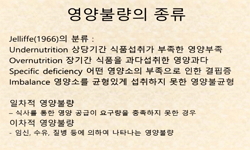It is important to supply adequate nutrition to critically ill patients, whose gastrointestinal system is properly functioning, through the enteral tube feeding if oral intake is impossible. In this study we investigated the changes in nutritional sta...
http://chineseinput.net/에서 pinyin(병음)방식으로 중국어를 변환할 수 있습니다.
변환된 중국어를 복사하여 사용하시면 됩니다.
- 中文 을 입력하시려면 zhongwen을 입력하시고 space를누르시면됩니다.
- 北京 을 입력하시려면 beijing을 입력하시고 space를 누르시면 됩니다.

병원 중환자의 경관유동식 공급 현황 및 영양상태 변화 = Degree of Enteral Tube Feeding in the Intensive Care Unit and Change in Nutritional Status
한글로보기https://www.riss.kr/link?id=A19729970
- 저자
- 발행기관
- 학술지명
- 권호사항
-
발행연도
2001
-
작성언어
Korean
- 주제어
-
KDC
594.05
-
등재정보
KCI등재
-
자료형태
학술저널
- 발행기관 URL
-
수록면
217-226(10쪽)
- 제공처
- 소장기관
-
0
상세조회 -
0
다운로드
부가정보
다국어 초록 (Multilingual Abstract)
The mean fasting period was 5 days before the enteral feeding and patients whose fasting period over 3 days were 51%. The mean enteral tube feeding period was 29 days and method of feeding was nasogastric, bolus feeding 6 times per day. The volume ordered was 69.7% of the patients' recommended calorie and volume infused was 86.6% of their volume prescribed. Accordingly, the volume infused was estimated 61.7% of their volume required. Only 44.6% of their reqiured volume was infused within 3 days after enteral tube feeding was started. It took 16 days in average to meet the patients' recommended calorie; 56% of subjects still did not fully met their requirements by the end point. Among the impeding factors in supplying enteral tube feeding, factors related to the number of feeding were high residual volume in stomach, vomiting, gastrointestinal bleeding, abdominal distension and surgery. Factors related to the actual infused volume were diarrhea, gastrointestinal bleeding, abdominal distension, airway management and tube reinsertion. Significant correlations were shown between the volume infused and changes in both the patients' weight and serum albumin level. Deviding the subjects into two groups by their infused volume, less than 70% and more than that, we compared the two to come up with a significant difference in their serum albumin level, -0.23 vs 0.21, and their body weight, -4.52 vs 0.12.
In enteral tube feeding, the volume delivered in sufficient to the patients' energy requirement can affect their nutritional status in critically ill patient; adequate nutritional management plan is essential It is necessary to make every effort to educate clinical staff and to set up a unified management program to prescribe adequate ammount of energy for the patient's nutritional requirement.
It is important to supply adequate nutrition to critically ill patients, whose gastrointestinal system is properly functioning, through the enteral tube feeding if oral intake is impossible. In this study we investigated the changes in nutritional status with enteral tube feeding according to the volume required. We investigated the volume ordered according to the patient's requirements, volume infused according to the volume ordered in 41 enteral tube feeding patients in intensive care unit from Jannuary to July, 2000. Body weight, serum albumin level, and total lymphocyte count were evaluated to assess nutritional status.
The mean fasting period was 5 days before the enteral feeding and patients whose fasting period over 3 days were 51%. The mean enteral tube feeding period was 29 days and method of feeding was nasogastric, bolus feeding 6 times per day. The volume ordered was 69.7% of the patients' recommended calorie and volume infused was 86.6% of their volume prescribed. Accordingly, the volume infused was estimated 61.7% of their volume required. Only 44.6% of their reqiured volume was infused within 3 days after enteral tube feeding was started. It took 16 days in average to meet the patients' recommended calorie; 56% of subjects still did not fully met their requirements by the end point. Among the impeding factors in supplying enteral tube feeding, factors related to the number of feeding were high residual volume in stomach, vomiting, gastrointestinal bleeding, abdominal distension and surgery. Factors related to the actual infused volume were diarrhea, gastrointestinal bleeding, abdominal distension, airway management and tube reinsertion. Significant correlations were shown between the volume infused and changes in both the patients' weight and serum albumin level. Deviding the subjects into two groups by their infused volume, less than 70% and more than that, we compared the two to come up with a significant difference in their serum albumin level, -0.23 vs 0.21, and their body weight, -4.52 vs 0.12.
In enteral tube feeding, the volume delivered in sufficient to the patients' energy requirement can affect their nutritional status in critically ill patient; adequate nutritional management plan is essential It is necessary to make every effort to educate clinical staff and to set up a unified management program to prescribe adequate ammount of energy for the patient's nutritional requirement.
동일학술지(권/호) 다른 논문
-
- 대한영양사협회
- 김복희
- 2001
- KCI등재
-
인터넷에서 행동 수정 이론을 적용한 체중 감량 상담 방법 개발
- 대한영양사협회
- 박선민
- 2001
- KCI등재
-
경상남도와 울산광역시 초등학교의 급식 및 영양관리 실태조사Ⅰ
- 대한영양사협회
- 이경화
- 2001
- KCI등재
-
경상남도와 울산광역시 초등학교의 급식 및 영양관리 실태조사Ⅱ
- 대한영양사협회
- 윤현숙
- 2001
- KCI등재




 ScienceON
ScienceON KISS
KISS




